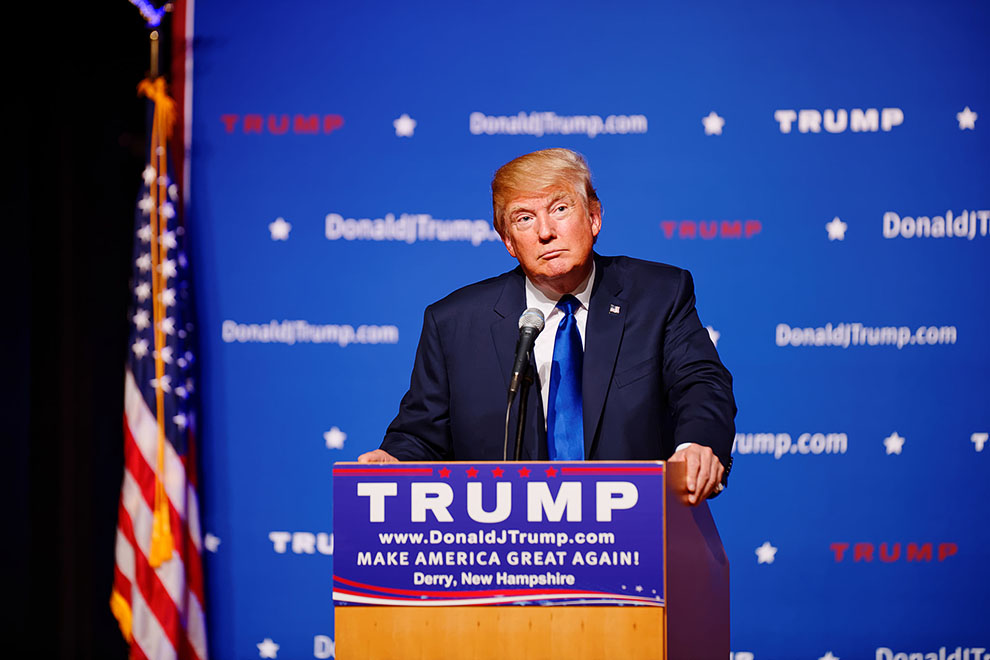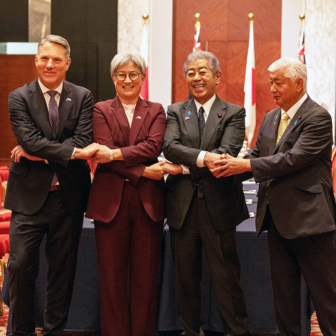Observers of American politics are increasingly bemused and concerned by Donald Trump’s lead in the Republican presidential primary race. His profile and pronouncements, and the unwillingness or inability of his rivals to hit back effectively, signal the desperate state of a party in thrall to its past, in fear of its most conservative elements, and in danger of losing its future.
The Trump phenomenon is an outstanding and somewhat illogical expression of Americans’ frustration with their political system – at least at the federal level – and its impact on their futures. His extreme policy pronouncements and the uncouth language he directs at his opponents in both parties is connecting with the Republicans’ conservative rump and unallied Americans who may or may not be voters.
Indeed, his appeal is strongest among those with little history of voting and those who like the chaos he can cause. Trump is feeding their poor opinions of Congress, their sense that the country is headed in the wrong direction, and their fears that American exceptionalism and the American dream have faded.
As a party and as individual candidates, the Republicans are yet to respond effectively, although this week Jeb Bush has lashed out with an anti-Trump advertising campaign. The Real Clear Politics average of the polls at the end of August shows Trump is garnering only 26.5 per cent of the Republican vote, so there are certainly opportunities for some of the other GOP candidates to confront him head-on in a way that could increase their own support and draw new voters to the party.
Almost certainly, voters would prefer their politicians to take concrete steps to improve the national economy and their own share of it, but so far Trump’s rivals have delivered only stale, retrograde pronouncements. As a consequence, they are seen as deserving of Trump’s ridicule.
Washington Post columnist E.J. Dionne summed it up this way:
That Trump is quite brilliant at faking authenticity (except for his thoroughly genuine belief that he’s far better than his opponents, whom he loves to brand as “losers”) should not be held against his supporters. It’s not hard to see why they get a kick out of the extent to which he is getting under the skin of his many critics.
Republicans currently face a clear choice: to continue to play to their diminishing but vocal traditional base, which is predominately white, male, ageing, and anachronistic on social issues, or to embrace a different future and start a long-term rebuild based around changing demographics and changing popular views on issues such as immigration, climate change and marriage equality.
Sticking with the increasingly off-putting views of its base (and the conservative media that support it) means the loss of young and minority voters and also threatens to undercut the party’s standing with corporate America, which is increasingly reluctant to be tied to politically unpopular causes. On the other hand, of course, these views are popular with people like the billionaire Koch brothers, who are expected to provide some $900 million for the 2016 Republican campaigns.
Donald Trump has been described as the “post-policy” candidate, but the reality is that he disdains both politics and policy. He believes that his business deal-making skills will suffice and, as such, he has no rigid ideology. For the moment at least, his own enormous personal wealth means he is not beholden to donors. He has not signed the Americans for Tax Reform pledge never to raise taxes; he is not necessarily opposed to single-payer healthcare (but does promise to repeal and replace Obamacare); he opposes cuts to social welfare, Medicare and Medicaid; and he has called for higher tariffs on imported goods.
But these moderate positions, which run counter to conservative dogma, are overshadowed by his outrageous attacks on Mexico and illegal immigration (mostly affecting Mexicans and other Hispanics). He proposes the mass deportation of eleven million people, including children born in the United States who are Americans citizens.
The Republicans’ problem is that the apparent popularity of Trump’s pronouncements has pushed the other candidates to match his extreme positions on issues like immigration. Inevitably, this will lead to yet another general election at which Hispanics are alienated from the Republican candidate, no matter who it is. The population of Hispanics eligible to vote in 2016 is expected to be twenty-eight million people, or 11 per cent of all voters, and they could well determine the outcome.
And it’s not just Hispanic voters who are repelled. A recent Wall Street Journal/NBC News poll showed that although 43 per cent of Republicans favour the mass deportations proposed by Trump, 75 per cent of Americans believe illegal immigrants should be allowed to stay. Among Republicans surveyed, 53 per cent supported a pathway to citizenship or a legal status short of citizenship for these illegal immigrants.
The real problem might be the one highlighted by Peter Beinart in the Atlantic magazine – that the GOP fails the empathy test with voters. As the Republican National Committee observed in its analysis of Mitt Romney’s 2012 defeat:
When it comes to social issues, the party must in fact and deed be inclusive and welcoming. If we are not, we will limit our ability to attract young people… We need to go to communities where Republicans do not normally go to listen and make our case. We need to campaign among Hispanic, black, Asian, and gay Americans and demonstrate that we care about them, too.
The Republican presidential candidates are failing to recognise that they are burdened by their party’s reputation for intolerance and their own incapacity to sense the country’s mood and respond to generational change.
Meanwhile, the increasing movement of the current presidential candidates to the right has provided the opportunity for Democratic senator and self-declared socialist Bernie Sanders to take the left flank. His support has surged as he loudly decries the large and growing gap between rich and poor in America. He is ahead of Hillary Clinton in Vermont and his message is resonating strongly in Iowa, the most critical of early states, where a Des Moines Register poll shows him trailing Clinton by only seven points.
Sanders may not be a total outsider. A recent Gallup survey found that 69 per cent of Americans aged 18 to 29 would vote for a socialist for president. Among all adults, more than 90 per cent would vote for a woman, a Black or a Hispanic candidate and 74 per cent would vote for a gay or lesbian candidate.
The real issue – for Donald Trump and the sixteen other Republican candidates, for Hillary Clinton and Bernie Sanders, for the political parties and for the average American – will come down to whether the people who show up to vote in the primaries and in the general election reflect the values of the population as a whole or those of the committed partisans.
In the meantime, it is up to his Republican competitors to topple Trump or see him ride roughshod over them to the party’s nomination as its presidential candidate. •




